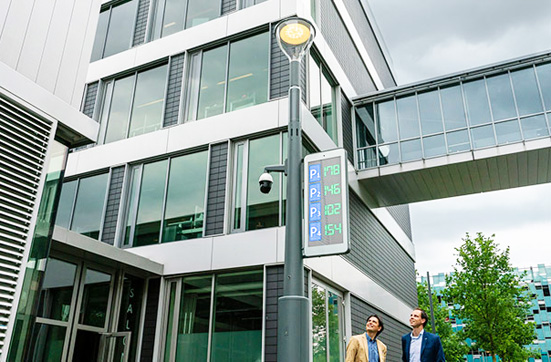Cyprus has decided to get clever with technology as it seeks to upgrade its towns with smart lighting poles which will not only replace older, less efficient streetlights but keep people connected.
Cyprus has already installed smart street lighting in several areas, but it is now looking to take this up a notch with smart poles capable of much more than saving power by coming on when needed.
The Electricity Authority of Cyprus has issued a tender document inviting bidders for €3 mln worth of ‘smart poles’ as part of a wider ‘smart city’ programme.
In procurement, the EAC invites Smart Pole manufacturers to supply upcoming projects as part of a “Smart City” transformation.
It is undertaking the promotion of smart poles to assist Municipalities in upgrading their services to their residents, by selecting technological functionalities which may transform towns into a “smart city” and facilitate everyday activities.
EAC spokesperson Christina Papadopoulou told the Financial Mirror: “Of course, controlling the light intensity based on movement is its core responsibility, but these smart fixtures will have multiple capabilities like traffic analytics, air quality monitoring, with some also acting as Wi-Fi access points.”
Papadopoulou said these smart poles will collect and provide passersby with information on the environment and weather.
“The smart poles will be able to pick-up basic information regarding weather conditions such as temperatures, humidity levels, wind speed and direction.
They will also be able to collect data on more complicated issues such as noise and air pollution.”
They can also provide internet access to drivers on the roads by acting as Wi-Fi access points.
Smart Poles can also accommodate an information publishing system by using small pitch size and High Definition (HD) outdoor full colour LED displays.
LED displays are extensively used for playing videos, photos, texts, and any promotional material required by the end customer.
Weather data can be shown on the upper and lower part of the screen without affecting the presentation of a picture or video shown at the same time.
“This introduces a whole new set of services such as telecommunication and advertising that can generate revenue for municipalities,” said Papadopoulou.
She explained the poles will be owned by the municipalities who will purchase them through the EAC.
The poles will be supplied with continuous electricity through the EAC’s underground distribution network system and also fibre cable to facilitate the fast transmission of data for the videos, announcements, internet.
They are also equipped with a public address audio system which can be programmed to emit warnings in emergencies or even signals for safe social distancing.
Some smart poles will also be equipped with a two (2) Megapixel cameras.
“These cameras will help authorities keep eye on road conditions to support the optimization of traffic flows. It also helps in maintenance decisions and emergency crew deployment”.
The smart poles tender was issued by EAC’s Non-Regulated Activities Unit which is responsible for all EAC activities that do not fall under the regulation of the Cyprus Energy Regulatory Authority CERA.
CERA regulates the areas of energy generation, transmission, distribution, and supply, among other energy-related areas.
EAC’s Non-Regulated Activities cover a wide range of activities.
These include the Desalination Plant at Vasiliko in Larnaca, e-charge service points for charging electric vehicles, street lighting maintenance, the photovoltaic park in Tseri, Nicosia and the use/exploitation of Telecommunications Infrastructure for other commercial use than that required for the electricity network.
More recently, EAC has bought its way into Cyprus’ Natural Gas Public Company (DEFA), which was set up to develop the necessary gas network infrastructure.
The call for tenders ends on 26 August and poles will be available once the contractor is identified and starts supplying the authority with the smart poles.
“These smart poles will, in the future, be able to play an important role in the development of mobile networks, contributing to wider coverage with signal and the reduction of the largest mobile stations,” Papadopoulou said.










